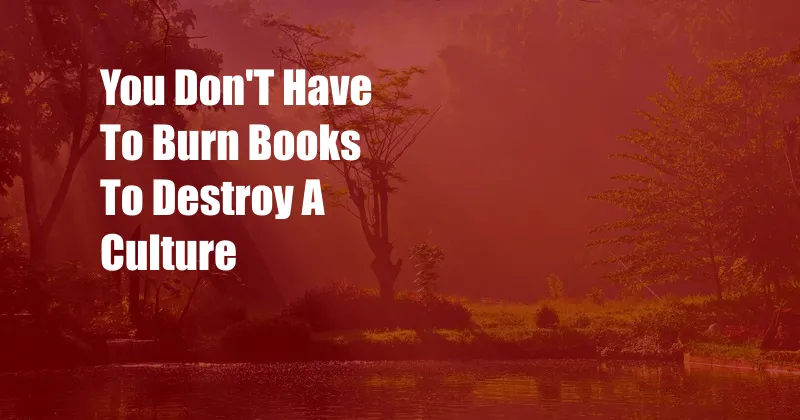
You Don’t Have to Burn Books to Destroy a Culture
As a passionate bibliophile, I was horrified when I stumbled upon a news article describing the destruction of a vast collection of books in a remote library. The sheer thought of losing such a treasure trove of knowledge and cultural heritage sent shivers down my spine. In that moment, I realized that the eradication of books is just one of the many insidious ways in which a culture can be systematically undermined.
Beyond physical destruction, a culture can be eroded through the manipulation of language, the control of media, and the suppression of critical thought. By carefully controlling the flow of information and ideas, those in power can shape the very fabric of a society, subtly and effectively reshaping its values, beliefs, and aspirations.
Silencing Dissent and Suppressing Truth
One of the most insidious ways to control a culture is to silence dissenting voices and suppress the truth. By marginalizing those who hold opposing views, the ruling elite can create an illusion of consensus and suppress alternative narratives. This often manifests in the form of censorship, where inconvenient facts and perspectives are actively suppressed through legal or social mechanisms, such as banning books, silencing journalists, or discrediting dissenting scholars.
By manipulating the flow of information, those in power can shape the way people perceive the world, creating a warped and distorted reality that serves their own interests. They can control the narrative, dictate the terms of debate, and effectively silence those who challenge their authority. In this way, they can maintain control and perpetuate their own power structures.
The Importance of Critical Thinking
To resist the erosion of our culture, it is imperative to cultivate critical thinking skills. We must question the information we encounter, challenge assumptions, and critically analyze the biases and motivations behind different perspectives. This includes evaluating the sources of information, considering alternative explanations, and seeking out diverse viewpoints.
By developing our critical thinking abilities, we become less susceptible to manipulation and more resistant to those who seek to control our thoughts and beliefs. We can recognize propaganda, resist indoctrination, and make informed decisions based on a thorough understanding of the issues at hand.
Tips and Expert Advice
Here are a few tips and expert advice to help you protect and preserve your culture:
- Support independent media and alternative news sources.
- Read widely and critically, exposing yourself to diverse perspectives.
- Engage in thoughtful discussions and debates, even with those you disagree with.
- Educate yourself about the history and culture of your society.
- Support organizations and initiatives that promote cultural preservation.
By following these tips, you can help to resist the erosion of your culture and preserve the richness and diversity of your heritage. Remember, the true power of a culture lies in the collective wisdom, creativity, and resilience of its people.
FAQ on Protecting Your Culture
Q: What are some other ways to protect my culture?
A: In addition to the tips mentioned above, you can also participate in cultural events, support local artists and artisans, and document and preserve traditional practices and knowledge.
Q: What are the benefits of preserving my culture?
A: Preserving your culture helps to maintain your sense of identity, connect you to your heritage, and promote social cohesion. It also enriches your life by exposing you to diverse perspectives, traditions, and art forms.
Conclusion
In a world where cultures are increasingly threatened by globalization, it is essential that we take proactive steps to protect and preserve our own. By being aware of the insidious ways in which a culture can be undermined, by developing critical thinking skills, and by actively engaging in the preservation of our cultural heritage, we can ensure the vitality and resilience of our societies for generations to come.
Are you interested in learning more about how to protect your culture? Share your thoughts and experiences in the comments below.